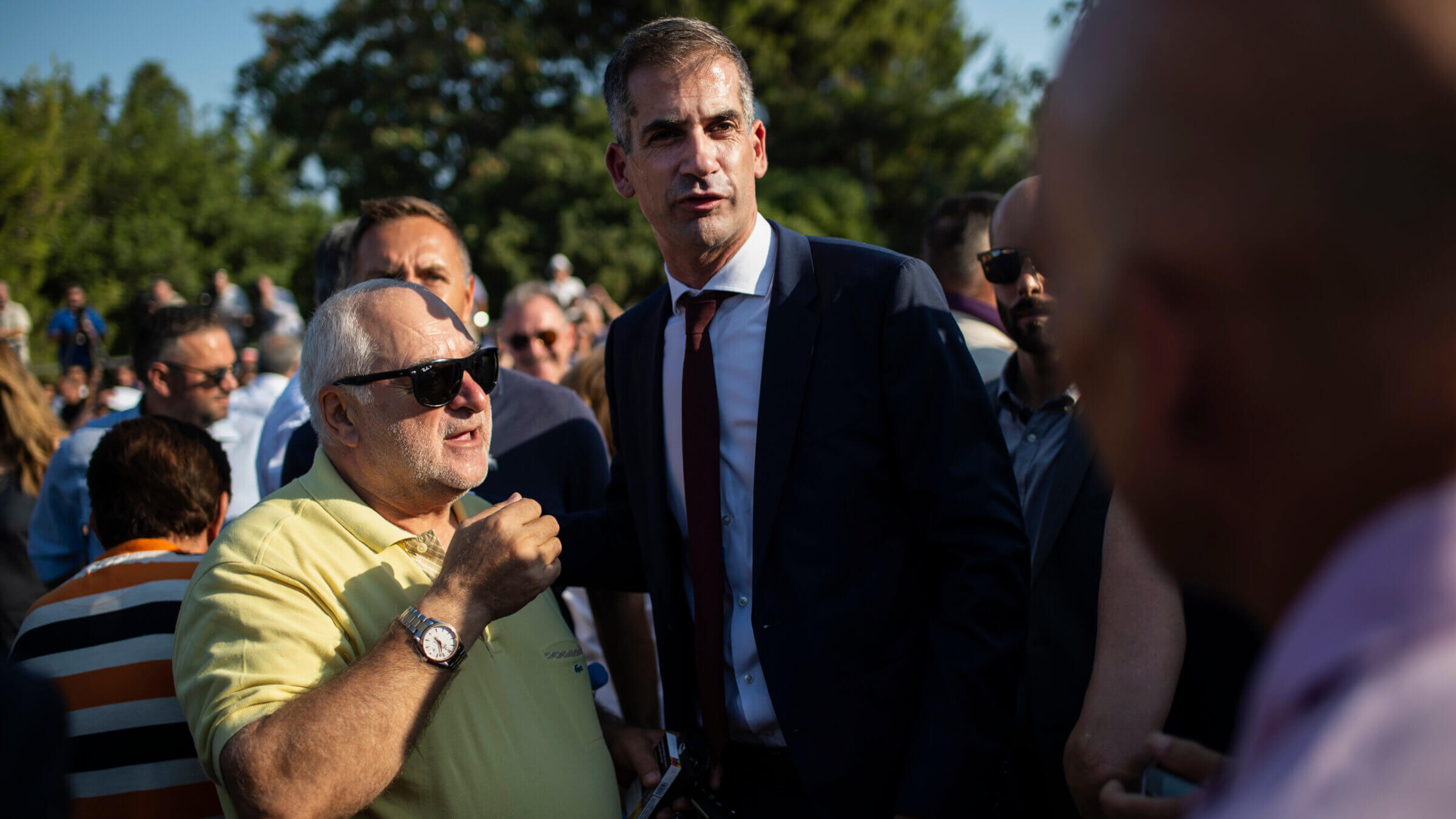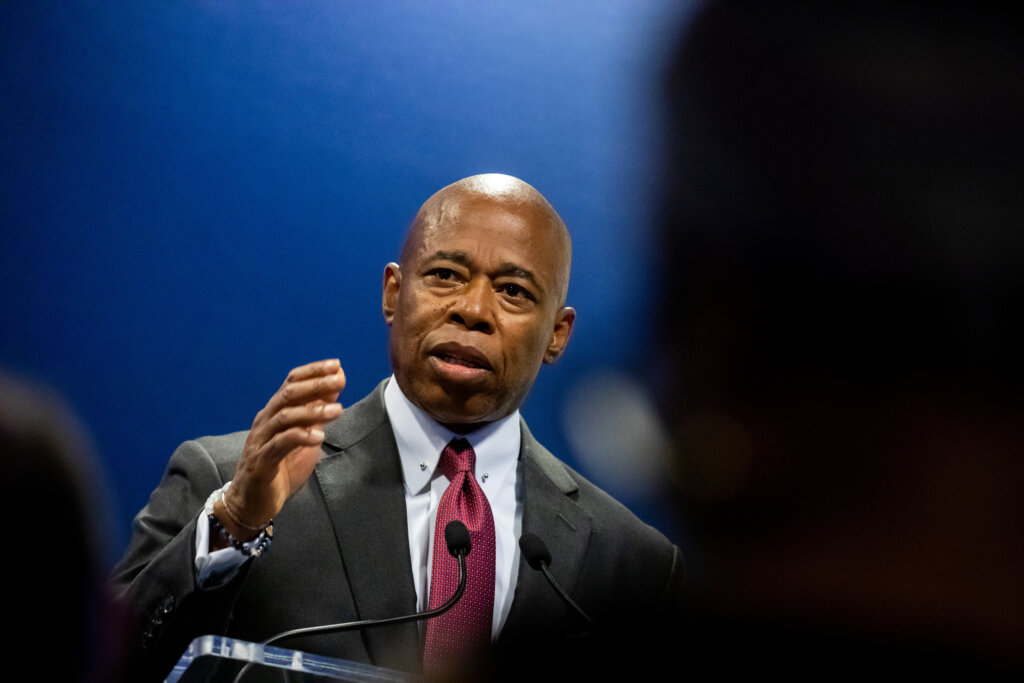AnalysisWhy didn’t organizers of mayoral summit on antisemitism tell the public about it?
The gathering of 25 mayors in Greece comes as tensions over how to fight antisemitism have divided the Jewish community

Costas Bakoyannis, the mayor of Athens, did not respond to a request for comment about why the mayoral summit on combating antisemitism that he’s co-hosting this week was not publicized until days before it began. Photo by Getty Images
When the Combat Antisemitism Movement held its inaugural summit for mayors last year, it created a website listing boldname speakers — including the leaders of Toronto, Frankfurt and Pittsburgh — and livestreamed the event from a television studio.
But the lead-up to this year’s conference, which convenes in Greece Wednesday, was far quieter — even with heightened concerns about rising antisemitism. Organizers recruited mayors, but in contrast to last year, gave little notice to the public that it was taking place. There was virtually no mention of the conference online and the first press release about the event came Monday, two days before the meeting was set to begin in Athens, announcing that New York City Mayor Eric Adams would be speaking at the event.
The Anti-Defamation League, which announced a partnership to address “hate and extremism” with 150 mayors through the U.S. Conference of Mayors in September, said this week that it was unaware that the conference was taking place.
Why the difference between last year’s summit and this year’s? It could relate to rising tensions within the Jewish community over how to confront antisemitism. Establishment groups — including organizations like the American Jewish Committee and Jewish Federations of North America, which is co-sponsoring the Greek summit — have called for addressing antisemitism across the political spectrum and see activism aimed at Israel as a particular cause for concern.
They are enjoying wins with this approach at the municipal and local levels. But at the same time, opposition is mounting from progressive critics who argue that politicians should focus on antisemitic white supremacy, and draw a clear distinction between antisemitism and anti-Zionism, which they argue is legitimate political speech.
Sacha Roytman, director of the Combat Antisemitism Movement, said the “summit is not secret” but that he intentionally avoided publicizing it in advance.

“We will have a lot of media around it but not ahead of the summit which isn’t helpful to facilitate a deep conversation between municipality leaders to exchange and discuss solutions to fight antisemitism on a local level,” Roytman said in an email to the Forward.
The organizers
The two-day conference is closely aligned with the establishment approach toward antisemitism, and the Combat Antisemitism Movement has close ties to both conservative political figures and the Israeli government. Organizers, keeping the conference’s profile low before it begins, may have succeeded in shielding it from unwanted criticism over its embrace of Israel, although at least one left-wing group managed a dig at the event’s sponsors.
“Greece is a beautiful place to travel to, who wouldn’t want to go?” Audrey Sasson, the director of New York-based Jews for Racial and Economic Justice, said in a statement. “But unlike Mayor Adams, most New Yorkers can’t just take all-expenses-paid trips funded by conservative lobbyists and the well-connected.”
Mayors in North America were recruited with the assistance of the Israel Action Network, a project of the Jewish Federations of North America, which began asking its member federations to invite local mayors to the summit last summer. The sample invitations for officials that were shared with local federations did not mention Israel, or concerns around anti-Zionism, instead referring to “contemporary” and “modern-day manifestations of antisemitism.”
But the ask came from Adam Teitelbaum, who oversees the organization’s Israel advocacy. A Jewish Federations of North America spokesperson said that the organization routed its work on antisemitism through the Israel Action Network because it sees significant overlap between antisemitism and anti-Zionism.
The conference appeared to frame “contemporary manifestations” of antisemitism as progressive attacks on the Jewish state. A session on Thursday morning, the first full day of the conference, about “concepts and definitions” is being led by Sima Vaknin-Gill, a former director of Israel’s Ministry of Strategic Affairs and Public Diplomacy, which has overseen the country’s opposition to boycotts and other left-wing activism.
Vaknin-Gill wrote an op-ed last year in which she claimed that progressives believed it was “offensive” to express sympathy for Jews experiencing antisemitism and that, by calling for equal concern over the treatment of Palestinians, they were “doing the work for the racists.”
The guest list
Twenty-five mayors and roughly an equal number of other government officials, including deputy mayors and some national representatives, are planning to attend the meeting. Adams, the New York mayor, is the most prominent American official attending the meeting and he has two speaking slots. But the conference is missing representatives from some of the larger cities that attended last year when the leaders of Toronto, Pittsburgh, Buenos Aires and Amsterdam were among the speakers.
This year, aside from Adams the largest of the 10 American cities that sent mayors to the conference are Albuquerque, New Mexico; Richmond, Virginia; Jackson, Mississippi, and Hialeah, a Miami suburb. Los Angeles sent its Jewish liaison. In addition to Kostas Bakoyannis, the mayor of Athens, several midsize European cities sent their mayors: Nicosia, the capital of Cyprus; Malmo, Sweden; Kishinev, Moldova; and Bialystok, Poland.
Mayors often face more immediate pressure from constituents than national officials to address various issues, and in recent years have begun participating in more international summits on topics like climate change and migration.
While many have praised these partnerships, some have raised concerns that cities may have more trouble vetting international opportunities than national governments.
“There’s certainly a difference between the level of capacity that local governments have — especially at the smaller, midsize level — just in terms of staff time and expertise,” said Tony Pipa, a senior fellow at the Brookings Institution who studies city diplomacy.

Pipa said that most of the pressure on cities to engage in international partnerships comes organically from constituents, as opposed to outside advocacy organizations like those organizing the summit in Greece, which he noted he was not familiar with.
The meeting, officially called the Mayors Summit Against Antisemitism, will also promote the International Holocaust Remembrance Alliance’s definition of antisemitism, which has been widely adopted by governments but harshly criticized by progressive activists and academics for the manner in which, they argue, it unfairly shields Israel from criticism.
While at least 27 states and a growing number of American cities have adopted the IHRA definition in some form, it has started receiving vocal resistance in recent months. Maryland’s Montgomery County, outside of Washington, D.C., delayed a vote on the definition this summer after opposition from activists and there was pitched debate about its adoption by Los Angeles City Council this fall. Both jurisdictions ultimately unanimously approved use of the definition.
Organizers declined a request by the Forward to attend the conference.
Hate groups leave coalition
The Combat Antisemitism Movement, which is sponsoring the Athens conference alongside the Center for Jewish Impact and the Jewish Federations of North America, was founded in 2019 and has close ties to Adam Beren, a Republican megadonor from Kansas. The organization is focused on building a coalition of Jewish and non-Jewish organizations to support its mission of promoting the IHRA definition of antisemitism, and it previously partnered with a nonprofit designated as an anti-Muslim hate group by the Southern Poverty Law Center.
The Combat Antisemitism Movement’s leadership previously defended the inclusion of that group, the Clarion Project, it is no longer listed as a partner on the organization’s website. Nor is Americans for Peace and Tolerance, another controversial former coalition member that has assailed the ADL for supposedly prioritizing Arabs and Muslims over Jews.
It is not clear whether the Combat Antisemitism Movement removed them, or whether they left voluntarily, or when they were taken down from the website. Roytman, the group’s director, did not respond to a request for comment about their removal.
The Clarion Project responded to an inquiry about the work with the coalition, but did not say how their partnership ended. “We have been honored to take part in the past,” a representative said in a brief email.
Americans for Peace and Tolerance did not respond to a request for comment.
Beren, an energy magnate based in Wichita, had previously donated to the Clarion Project. The two organizations were glaring outliers in a coalition of several hundred organizations that included some mainstream conservative groups alongside establishment stalwarts like the American Jewish Committee — whose new chief executive, Ted Deutch, is speaking at the Athens event — Hadassah, the Jewish Council for Public Affairs, Jewish Federations of North America and scores of smaller nonprofits.
The Center for Jewish Impact, which is also organizing the conference, is an Israeli organization that seeks to “elevate the relationships and status of Israel within and in relation to the global diplomatic community and world Jewry,” according to its website. A representative said it helped connect Greek and Israeli officials with the conference.
The conference includes panels where officials will discuss local strategies to stop antisemitism, a visit to the Athens Holocaust memorial and the signing of a joint declaration.
A message from our Publisher & CEO Rachel Fishman Feddersen

I hope you appreciated this article. Before you go, I’d like to ask you to please support the Forward’s award-winning, nonprofit journalism so that we can be prepared for whatever news 2025 brings.
At a time when other newsrooms are closing or cutting back, the Forward has removed its paywall and invested additional resources to report on the ground from Israel and around the U.S. on the impact of the war, rising antisemitism and polarized discourse.
Readers like you make it all possible. Support our work by becoming a Forward Member and connect with our journalism and your community.
— Rachel Fishman Feddersen, Publisher and CEO




























